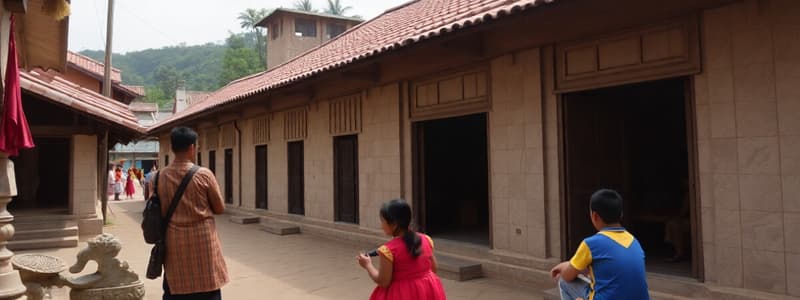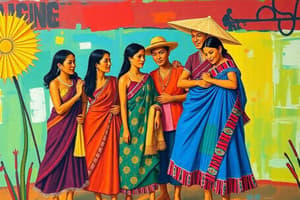Podcast
Questions and Answers
What is the primary focus of the subject Araling Panlipunan?
What is the primary focus of the subject Araling Panlipunan?
- Information Technology
- Mathematics and Science
- Art and Literature
- Social studies related to the Philippines (correct)
Which historical figure is known for his role in the Philippine Revolution?
Which historical figure is known for his role in the Philippine Revolution?
- Ramon Magsaysay
- Emilio Aguinaldo
- Jose Rizal
- Andres Bonifacio (correct)
What aspect of geography does Araling Panlipunan specifically examine regarding the Philippines?
What aspect of geography does Araling Panlipunan specifically examine regarding the Philippines?
- Transportation systems across the islands
- Political borders with neighboring countries
- Historical land disputes and treaties
- Geographical features, climates, and natural resources (correct)
Which teaching method is emphasized in Araling Panlipunan to encourage critical thinking?
Which teaching method is emphasized in Araling Panlipunan to encourage critical thinking?
What is a fundamental component of the study of Government and Politics in Araling Panlipunan?
What is a fundamental component of the study of Government and Politics in Araling Panlipunan?
Which of the following is NOT an aspect covered in the Economics component of Araling Panlipunan?
Which of the following is NOT an aspect covered in the Economics component of Araling Panlipunan?
How does Araling Panlipunan aim to foster nationalism among students?
How does Araling Panlipunan aim to foster nationalism among students?
What type of assessment is used in Araling Panlipunan to evaluate research and communication skills?
What type of assessment is used in Araling Panlipunan to evaluate research and communication skills?
Flashcards are hidden until you start studying
Study Notes
Araling Panlipunan Overview
- Araling Panlipunan is the subject in the Philippine curriculum focusing on social studies.
- It covers various aspects of society, culture, history, and geography relevant to the Philippines.
Key Components
-
History
- Study of Philippine history from pre-colonial times to present.
- Key events include the Spanish colonization, American occupation, and the Philippine Revolution.
- Historical figures: José Rizal, Andres Bonifacio, Emilio Aguinaldo, among others.
-
Geography
- Examination of the Philippines’ geographical features, including islands, climates, and natural resources.
- Understanding of local and global geography and the Philippines' position in Southeast Asia.
-
Culture and Society
- Exploration of Filipino culture, traditions, language, and festivals.
- Discussion of social issues, government structures, and citizen responsibilities.
-
Government and Politics
- Study of the Philippine government system, including the Constitution and branches of government.
- Understanding the electoral process and the role of local government units.
-
Economics
- Overview of the Philippine economy: agricultural, industrial, and service sectors.
- Introduction to basic economic concepts such as supply and demand, resources, and trade.
Teaching Methods
- Use of multimedia resources (videos, documentaries) to enrich learning.
- Group discussions and collaborative projects to encourage critical thinking.
- Field trips to historical sites and cultural events for experiential learning.
Assessment and Evaluation
- Quizzes and tests focusing on factual recall and application of concepts.
- Projects and presentations to develop research and communication skills.
- Participation in class discussions to assess understanding and engagement with the subject matter.
Importance of Araling Panlipunan
- Fosters nationalism and historical awareness among students.
- Encourages an understanding of civic duties and active participation in society.
- Develops critical thinking skills through analysis of historical and contemporary issues.
Araling Panlipunan Overview
- Araling Panlipunan, or Social Studies, is a subject in the Philippine curriculum
- It helps students understand society, culture, history, and geography of the Philippines.
Key Components
- History: Focus on Filipino history from pre-colonial times to today.
- Key events include the Spanish colonization, the American occupation, and the Philippine Revolution.
- Important figures include José Rizal, Andres Bonifacio, and Emilio Aguinaldo.
- Geography: Focus on the Philippines' geographical features, like islands, climates, and resources.
- Includes understanding the Philippines' position within Southeast Asia and its relationship with global geography.
- Culture and Society: Explores Filipino culture, traditions, language, and festivals.
- Discussions cover social issues, government structures, and citizen responsibilities.
- Government and Politics: Focuses on the Philippine government system, including the Constitution and branches of government.
- Discusses the electoral process and the role of local government units.
- Economics: Gives an overview of the Philippine economy, including agricultural, industrial, and service sectors.
- Includes basic economic concepts like supply and demand, resources, and trade.
Teaching Methods
- Uses multimedia resources like videos and documentaries to enhance learning.
- Encourages critical thinking through group discussions and collaborative projects.
- Provides experiential learning through field trips to historical sites and cultural events.
Assessment and Evaluation
- Assesses students through quizzes and tests that measure recall and application of concepts.
- Encourages students to develop research and communication skills through projects and presentations.
- Monitors student understanding and engagement through participation in class discussions.
Importance of Araling Panlipunan
- Develops nationalism and historical awareness among students.
- Encourages understanding of civic duties and active participation in society.
- Develops critical thinking skills through analysis of historical and contemporary issues.
Studying That Suits You
Use AI to generate personalized quizzes and flashcards to suit your learning preferences.





